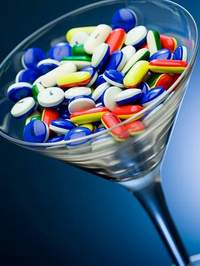Brittany Murphy — Another Victim of Prescription Drug Abuse?
When I heard shortly before Christmas that another Hollywood star died of suspected prescription drug interactions, I thought, “Here we go again…”
 Brittany Murphy — young, beautiful and only 32 was the latest rider on the Fame-Drugs-Dysfunctional lifestyle carousel. A month later, still no official cause of death has been issued although rumors abound. The death certificate said “natural causes” and “cardiac arrest.” In the absence of congenital defects or some type of disease, cardiac arrest in a 32-year-old female is not natural.
Brittany Murphy — young, beautiful and only 32 was the latest rider on the Fame-Drugs-Dysfunctional lifestyle carousel. A month later, still no official cause of death has been issued although rumors abound. The death certificate said “natural causes” and “cardiac arrest.” In the absence of congenital defects or some type of disease, cardiac arrest in a 32-year-old female is not natural.
“Don’t Say a Word” was a shrink-flick, so I had to go see it. Poor Brittany was hospitalized with PTSD, and Michael Douglas (the swashbuckling shrink) had to break through the psychotic babbling to find out the location of stolen gems or money or whatever the bad-guys wanted. In short – it was more James Bond than Sigmund Freud.
Brittany’s personal life sounded a little like the messed-up victim of that old movie.
Possibly diabetic, possibly abusing prescription drugs, plagued with an eating disorder, striving to overcome her low self-esteem with cosmetic surgery, and married to a person that many in Hollywood consider shady.
In fact, the husband didn’t seem to want an autopsy when she died. Unfortunately this decision is left up to a coroner and not the family.
The best thing I can say about this state of affairs is that we may actually have derived a new definition of romantic love. It may simply be that True Love is when you don’t want any of the authorities to know what drugs are in your partner’s body, dead or alive.
By now everyone should know that just because a drug is prescribed by a doctor does not mean it is safe. Also, everyone seems to assume that patients take drugs as prescribed and nobody ever mixes them up, or takes a tad extra.
Come on…
Even my mother of blessed memory — who could not have been confused with a movie star on her best days — sometimes took a little extra of something (often allergy medicine) because it helped her sleep so nicely. So I can tell you for sure that even though my credentials for psychopharmacology are helpful theoretically, they are not terribly helpful when trying to talk sense to my mother.
I have actually offered to get down on my knees to a patient in gratitude if they would tell me what they actually took, including over-the-counter drugs. Even when they try to do so, they sometimes get memory failure of unknown origin, or tell me, with innocent eyes, they did not think it would make much difference.
A Dr. Cyril Wecht sounds like he has a lot of experience with cases of this sort. What he says has a ring of truth. People mix drugs, including prescriptions for those “close” to them and a couple under false names and such. The things he says do sound a lot like what I hear elsewhere, and he makes sense. He is a pretty controversial guy himself, back to JFK autopsy investigations and the like but somehow he cited these four drugs: Klonopin, Ativan, hydrocodone and vicoprofen.
In his overview of this case in the three references cited above, his general review seems consistent with my knowledge and experience.
Klonopin (clonazepam) and Ativan (lorazepam) which are both members of the class “benzodiazepines.” Long ago hailed as safer than barbiturates because of less depression of heart and respiratory depression, they are pretty habituating, even in low doses. People who use them do often have a tendency to up their doses as time passes and their tolerance increases.
Their effect on the brain is similar to that of alcohol, in that they diminish — often extinguish — Rapid Eye Movement sleep, which is dream time. They diminish reaction time, which can and often does mean a higher propensity for auto accidents.
People do, often, take low doses for a long period of time without clinically significant negative effects, I often see the chronic low dose use directed at people in the public health and charity clinics when there are neither resources nor inclination to get a little bit of therapy and decide why they are anxious in the first place. The goal in such instances is simply to maintain — not to make better or cure.
The British treat them far more rationally than we do. Although “protocols” are a little too structured for a world where everyone is different, I tip my hat to Professor Dr. Heather Ashton who has been the director of some kind of a downtown London benzodiazepine clinic for plenty of years. I wish more American physicians knew about her work.
Two other medications were identified as hydrocodone and vicoprofen. These are both opioids, although with vicoprofen, there is a little of ibuprofen mixed in. Now ibuprofen is an NSAID, “non-steroidal anti inflammatory” drug. This class of drug kills an estimated 10 thousand people worldwide annually, which is not what is going on here. It kills people by making ulcers which can eat into a blood vessel in the stomach and bleed you to death. The medical examiner would have mentioned it.
Basically, however, we are talking about two drugs that are classified as “opiates.” Approaches to the problem on the net range from the touchingly distant and academic Harvard approach , to the realm of home remedies.
 In various practice situations I have helped people with both of the above on an outpatient basis, using natural substance methods instead of addictive and potentially-abusive drugs, and they do just fine — if they decide they actually want to quit and if they actually follow directions. Transition does not have to be painful and punitive, like a lot of AA or NA people, especially the older ones, seem to believe.
In various practice situations I have helped people with both of the above on an outpatient basis, using natural substance methods instead of addictive and potentially-abusive drugs, and they do just fine — if they decide they actually want to quit and if they actually follow directions. Transition does not have to be painful and punitive, like a lot of AA or NA people, especially the older ones, seem to believe.
It does not have to be done in a private expensive resort in some place like Malibu with horseback riding, Pilates and yoga, either. It just has to be done intelligently with people who will articulate their problems and listen open-mindedly to answers that work.
The late Ms. Murphy”s personal physician is quoted as saying none of the drugs is illegal. “Gag me with a spoon,” like they say in the Valley. If he had any idea she was taking everything together, or getting them from relatives, and said and did nothing he should be in deep doo-doo.
I do not how it has become an epidemic among young and successful celebrities to try to live on the edge of free-lance pharmacology. These are not the people who “have” to make drugs in the basement to survive. They seem to have chosen a potentially deadly pharmacology, which is not exactly cutting edge.
Are they so desperate just to sleep soundly or feel vaguely high that they are playing games with their lives ? Something in me wants to believe that these are not simply suicide attempts in a world where suicide notes have gone out of fashion.
If they all had congenital conditions (such as a heart defect) they would know and we would know, and the doctor quoted would be right. We would not have to wait weeks for toxicology reports. Maybe it is just a sense of entitlement — a seeking of sensations.
In several cases over the past few years (Anna Nicole Smith and Heath Ledger, as well as Ms. Murphy) there is some insider account of recent colds or flu as if to justify a bunch of prescriptions found on the bedside table and in the bloodstream.
In many of these cases, it seems they are also in denial about eating disorders. And people have been throwing names around like “borderline personality disorder” — which is not a major mental illness and doesn’t carry the stigma of something like bipolar illness. All of these things may be true. I have little patience for people who discuss naturally thin figures. Who uses nutritionists? Who has not succumbed to the demands of their profession, which probably take a role in developing disorders? I’ve known and cared for actors and dancers and models and their lifestyles are ruthless — not “healthy.”
Drug interactions may have played a role in this latest celebrity death. Even without a congenital defect, both classes of drugs can diminish the frequency and the contraction force of the heart. Put them together, and the effects are magnified. Who knows what else was added? More and more drugs are available in non-prescription strengths. Even over the counters, if taken for flu or other ills, can be magically “doubled up.” Then, you often have the prescription strength. Like with that golden oldie, diphenhydramine (Benadryl).
I have the eerie feeling that I am covering the same story I have covered before. That I am simply waiting for a toxicology report to provide more information regarding individual drugs. My guess is that any information I provide about drugs is more than Brittany Murphy read. They do not screen starlets for intelligence and many have a Svengali steering every movement and decision.
Mixing prescription drugs seems like easy recreation, since too many doctors are spineless and seem to give anyone anything they want. Like the comedian Dennis Miller said a long time ago, there are only two kinds of doctors — The ones who give strangers Vicodin over the phone and the ones who do not. Yours truly does not.
Getting drugs from doctors and combining them is a dangerous form of recreation that may have become the norm. This past-time may have replaced Russian Roulette for the bored and pathological celebrity; a celebrity with pressures. They may be the result of an incipient public appearance (as in the Michael Jackson case) or a cry for affection and attention or some other deep-seated need, but the minute people start using their sense of entitlement for mindlessly juggling drugs, death is a real possibility in the mixture.
Filed under Celebrities by on Jan 15th, 2010. Comment. ![]()
Leave a Comment
Comments on Brittany Murphy — Another Victim of Prescription Drug Abuse?
Prescription drug abuse is affecting both rich and poor. The NIDA list prescription drugs as the 3rd most abused drug family in the nation.
The only two drugs ahead of prescriptions are tobbaco and alcohol.